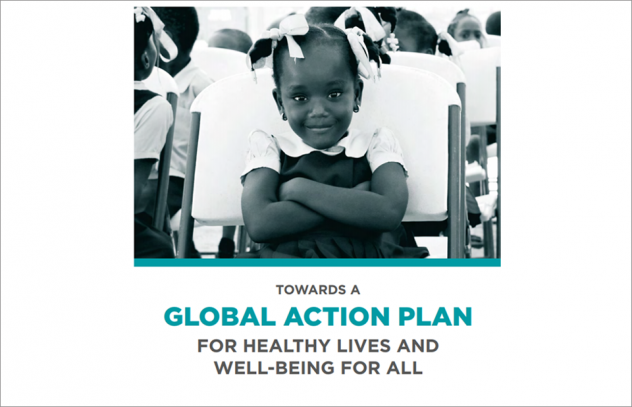保健分野の主要な国際機関11組織が10月16日、『すべての人に健康な生活と福祉を保証するための世界行動計画(The Global Action Plan for Healthy Lives and Well-being for All)』という協定を結びました。持続可能な開発目標(SAGs)の保健関連ターゲットの達成に向けて協力体制を組み、重複を避けつつ最大限の成果を上げていこうという協定です。
ドイツのメルケル首相ら政治指導者の要請を受け、世界保健機関(WHO)が主導して結ばれたようです。
国連合同エイズ計画(UNAIDS)の公式サイトにもプレスリリースが載っていたのでそちらを訳しました。WHOのリリースと同じものです。
最近は世界中でいろいろなことが起き過ぎるほど起きていますね。したがって、あまり目立たなくなってしまった感じもしないことはないのですが、世界はいまSDGsの枠組みのもとに動いているという視点は一応、抑えておく必要があると思います。
一方で、SDGsそのものに関しては、2016年に鳴り物入りで勢いよくスタートを切ったものの、いざ始めてみると2030年の目標達成はかなり苦しいねと改めて認識せざるを得ない。それが現状でしょうか。
保健分野についていえば、17ある目標のうち保健に特化した目標はひとつ(目標3)に押し込められています。ミレニアム開発目標(MDGs)とはえらい違いですが、いまさらそのことに文句を言っても始まりません。
そもそも、人の健康はすべての開発目標の基盤ということで、SDGsと保健の関係は目標3だけにとどまるものではありません。リリースによると、保健関連のターゲットはSDGs17目標のうち14目標の50件近くに及んでいるそうです。こうなるとそれぞれの分野の専門機関がてんでんばらばらに「あれが必要」「これもやりたい」と言い出したら収拾がつかない。
外野からこういうことを素人が言い出すと、たちまち石つぶてが飛んできそうですが、ただでさえ縄張りには執着が強い方々が多くいらっしゃるのではないかと、かねがねお見受けしていました。ある程度、そうした自覚もあるのでしょうね、重複がないように調整しつつ協力して取り組んでいこうというのは当たり前のことだと思うけれど、それがなんと歴史的な取り決めなのだそうです。憎まれ口はこの程度にしてリリースの日本語仮訳をお読みいただきましょう。

グローバルヘルス関連機関が目標達成に向け新たな協力体制を約束
プレスリリース
【ベルリン 2018.10.16】 保健、開発分野で世界を主導する11機関の代表が本日、国連の持続可能な開発目標(SDGs)達成に向け、新たな協力強化の道を探る画期的なコミットメントに署名した。
世界保健機関(WHO)の調整により、このイニシアティブは11機関の仕事をつなげ、次のフェイズへと踏み出していく。
このコミットメントはドイツのアンゲラ・メルケル首相、ガーナのナナ・アクフォ=アド大統領、ノルウェーのエルナ・ソルベルグ首相の要請を受け、アントニオ・グテレス国連事務総長の支援のもとで、2030年の持続可能な開発目標における保健分野のターゲットの達成に向けて世界の主要機関がより協力を強化するための計画の策定を目指している。
「貧困を解消し、平和で包摂的な社会と安心できる環境を生み出すための持続可能な開発には人々の健康が不可欠です。しかし、主要な死亡と疾病の原因に対する対策はこれまでに大きな成果を上げてきたとはいえ、さらに努力を倍増させなければいくつかの保健関連のターゲットの達成は望めません」と各機関は本日、ベルリンで開かれた世界保健サミットで発表した。「すべての人に健康な生活と福祉を保証するための世界行動計画は、2030年のゴール達成に向けた成果を促す歴史的な約束であり、協力して取り組むための新たな方法を示しています」
各機関は、資金を最大限に生かし、より透明性が高く、積極的な関与が可能になる手法の実現をはかるために協力していくことで合意した。この計画の第一フェイズは、align(提携)、 accelerate(加速)、 account(評価)の 3つの戦略アプローチで構成されている。
Align:集合的な効果を高め、ジェンダーの平等やリプロダクティブヘルス、メンタルヘルス、新生児、児童、若者の健康などいくつかの優先事項の成果を上げていけるようにするため各機関は計画策定、資金確保、実施のプロセスを調整して進めていくことを約束した。
Accelerate:各機関は共通のアプローチを策定し、グローバルヘルスに関して成果達成を加速する可能性がある分野での活動を調整しながら進めていくことで合意した。7つの初期acceleratorsには、コミュニティと市民社会の関与、研究開発、データ、持続可能な資金確保などが含まれている。
Account:各国や開発パートナーへの透明性と説明責任を向上させるため、各保健機関は14の持続可能な開発目標分野にまたがる50近くの保健関連ターゲットについて、新たに共通の里程標を設定して取り組む。この里程標は重要なチェックポイントであり、2023年段階で世界がどこまで到達しているか、そして2030年目標の達成軌道に乗っているかどうかをはかる共通の指標になる。
世界行動計画は、保健へのアクセスの障壁であり、女性や女児が性と生殖に関する保健サービスを含めた包括的で質の高いヘルスケアを受けることを妨げているジェンダーの不平等に対し、その解消に向けた集合的な行動を促し、資金を確保するテコにもなる。
すべての人に健康な生活と福祉を保証するための世界行動計画には以下の期間が署名をした:GAVIワクチンと予防接種のための世界同盟、世界エイズ・結核・マラリア対策基金(グローバルファンド)、グローバル・ファイナンシング・ファシリティ(GFF)、UNAIDS、UNDP、UNFPA、UNICEF、ユニットエイド、UNウィメン、世界銀行、WHO。世界食糧計画は2、3か月中に参加することを約束。
最終計画は2019年9月の国連総会で発表の予定。詳細は下記サイトでご覧ください。
http://www.who.int/sdg/global-action-plan
Global health organizations commit to new ways of working together for greater impact
BERLIN, GERMANY, 16 October 2018—Eleven heads of the world’s leading health and development organizations today signed a landmark commitment to find new ways of working together to accelerate progress towards achieving the United Nations’ Sustainable Development Goals.
Coordinated by the World Health Organization, the initiative unites the work of 11 organizations, with others set to join in the next phase.
The commitment follows a request from Chancellor Angela Merkel of Germany, President Nana Addo Dankwa Akufo-Addo of Ghana, and Prime Minister Erna Solberg of Norway, with support from United Nations Secretary-General Antonio Guterres, to develop a global plan of action to define how global actors can better collaborate to accelerate progress towards the health-related targets of the 2030 Sustainable Development Agenda.
“Healthy people are essential for sustainable development – to ending poverty, promoting peaceful and inclusive societies and protecting the environment. However, despite great strides made against many of the leading causes of death and disease, we must redouble our efforts or we will not reach several of the health-related targets,” the organizations announced today at the World Health Summit in Berlin. “The Global Action Plan for Healthy Lives and Well-being for All represents an historic commitment to new ways of working together to accelerate progress towards meeting the 2030 goals. We are committed to redefine how our organizations work together to deliver more effective and efficient support to countries and to achieve better health and well-being for all people.”
The group has agreed to develop new ways of working together to maximize resources and measure progress in a more transparent and engaging way. The first phase of the plan’s development is organized under three strategic approaches: align, accelerate and account.
Align: The organizations have committed to coordinate programmatic, financing and operational processes to increase collective efficiency and impact on a number of shared priorities such as gender equality and reproductive, maternal, newborn, child and adolescent health.
Accelerate: They have agreed to develop common approaches and coordinate action in areas of work that have the potential to increase the pace of progress in global health. The initial set of seven “accelerators” include community and civil society engagement, research and development, data and sustainable financing.
Account: To improve transparency and accountability to countries and development partners, the health organizations are breaking new ground by setting common milestones for nearly 50 health-related targets across 14 Sustainable Development Goals. These milestones will provide a critical checkpoint and common reference to determine where the world stands in 2023 and whether it is on track to reach the 2030 goals.
The Global Action Plan will also enhance collective action and leverage funds to address gender inequalities that act as barriers to accessing health, and to improve comprehensive quality health care for women and girls, including sexual and reproductive health services.
The organizations that have already signed up to the Global Action Plan for Healthy Lives and Well-being for All are: Gavi the Vaccine Alliance, the Global Fund to Fight AIDS, Tuberculosis and Malaria, the Global Financing Facility, UNAIDS, UNDP, UNFPA, UNICEF, Unitaid, UN Women, the World Bank and WHO. The World Food Programme has committed to join the plan in the coming months.
The final plan will be delivered in September 2019 at the United Nations General Assembly.
For more information, www.who.int/sdg/global-action-plan